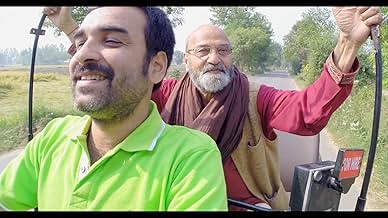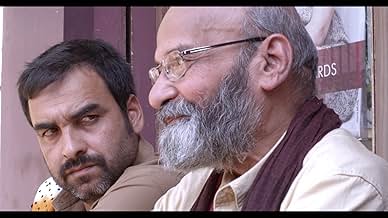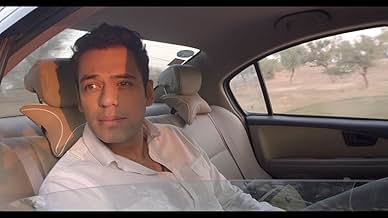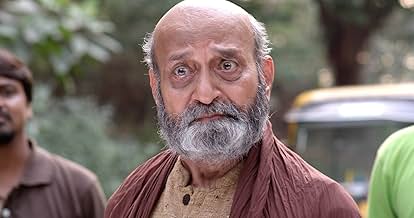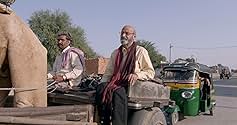A Hindu doctor with dementia and a Muslim auto rickshaw driver form an unlikely friendship as they cross India in search of the doctor's childhood home.A Hindu doctor with dementia and a Muslim auto rickshaw driver form an unlikely friendship as they cross India in search of the doctor's childhood home.A Hindu doctor with dementia and a Muslim auto rickshaw driver form an unlikely friendship as they cross India in search of the doctor's childhood home.
- Director
- Writers
- Stars
- Awards
- 12 wins total
Audrey LeCrone
- Maria
- (as Audrey Wagner)
- Director
- Writers
- All cast & crew
- Production, box office & more at IMDbPro
Featured reviews
Wonder what was the reason for choosing english as the language of delivery. It just does not make sense and gives a feeling that the movie isn't for Indian audience.
The protagonist of the film Dr.Amit (doppleganger of Amit Shah :)) is suffering from Dimentia in some last years of his life. Being a loner, he misses his childhood home and friend, is haunted by the childhood memories and then one fine day he befriends an autowala in his city and breaks free on a journey visiting certain places cherishing his old memories. The route of the journey is in reverse to his memories, i.e. he first visits place where his son was born, then the temple where he got married, the college where he studied and got his degree, the orphanage where he grew up and finally the village where he was born and brought up as a child. He used to relive those old moments linked to that particular place. Also throughout the journey the bond between the auto driver and the doctor is developed which is much more than between the doctor and his son.
Story was nice, but the fault that I found was in dilogue delivery. The dialogues were entirely in english, had they been in hindi the audience could have connected themselves more interestingly. Although in english they were poorly wtitten and delivered. And by the end of the film you will feel bored, reason being the monotonous dialogues. I think the intensity and the feel of the script was lost because of improper expression of words.
Mango Dreams is a light and slow movie which actually depicts no matter how old you grow or how much you have earned, when you reach those last days of your life you will always wish to travel back to your childhood days. Especially when you are parted from your home town.
So friends, you can watch it once and there is also a nice surprise waiting for you at the end of the movie to make you delighted.
Story was nice, but the fault that I found was in dilogue delivery. The dialogues were entirely in english, had they been in hindi the audience could have connected themselves more interestingly. Although in english they were poorly wtitten and delivered. And by the end of the film you will feel bored, reason being the monotonous dialogues. I think the intensity and the feel of the script was lost because of improper expression of words.
Mango Dreams is a light and slow movie which actually depicts no matter how old you grow or how much you have earned, when you reach those last days of your life you will always wish to travel back to your childhood days. Especially when you are parted from your home town.
So friends, you can watch it once and there is also a nice surprise waiting for you at the end of the movie to make you delighted.
10mcdflint
This a beautiful film; beautiful photography; beautiful heartfelt acting; a beautiful story. Please watch it!
I admit it. I'm a Westernized American Capitalist who just recently learned the difference between the "Bollywood" film industry and independent filmmaking from India. I got schooled. See, Americans aren't that enamored by Indian films for the most part. In all fairness, the same could be said of most Americans whenever it concerns international or art house cinema in general. "This is 'Merica Dammit! We like our whiskey straight and our TVs loud! And we don't often mix deep social consciousness, honest history, or gender and class issues with our blockbusters!" (But when we do, it's magnificent.)
I find myself looking more and more into Indian History each time I see an Indian film. So much of their work has to do with their cultural and societal evolution. A history of class struggle, compounded with British colonizers and a global economy lusting for cheap access to a land rich with resources and industrious people. And of course, a vast religious divide which has separated friends and family, through the best of political intentions.
"Mango Dreams" is a story that begins with two friends who became separated at youth by a simple childish argument. Only to have a wall driven between them for almost a lifetime of regret, by the partitioning between India and Pakistan.
Filmmaker and Director, John Upchurch is a storyteller from the rural farmlands of North Carolina. Surprise! And believe it or not, this is his first feature film. John's always had an affinity for Indian, (Hindi or Bengali) films. In his own words he says, "Growing up, the best entertainment could always be found at the feet of local storytellers; my grandparents, the farmers at the hardware store, my barber, etc. I love how their stories sparked my imagination, opened my mind to new ideas, and encouraged me to care about the world around me."
The good and kind Doctor Amit Singh played by Ram Gopol Baja, survived the partitioning but not without severe emotional angst and regret. As his age and dementia sets in he is driven by a need to return to his homeland to find closure, finally after all these years. Amits's memories are haunted by the massacre of his family by Muslims and the guilt he feels for the death of his brother. Before dementia sets in completely he begins a race against time to return to his past and find peace.
Amit's son, Abhi, (Samir Kochhar), who lives in America, comes home to see that his father is efficiently "entombed" in the old folks home for his own welfare. Amit makes a break for it and happens across an auto-rickshaw driver named Salim (Pankaj Tripathi), a Muslim with his own history. Salim's wife sadly; ironically, was raped and burned to death by Hindus. An early connection brings them to this impasse. Dr. Amit once saved Salim's son's life and as a poor man with a conscience, Salim has always been ready to repay that debt in some reciprocal way.
Amit asks a favor of Salim and that is, to take him "home". Salim agrees but has no idea where home is. He only gets directions and distances that lead him farther and farther away from his own destination, and what's worse, the entire trip is for free! Salim being a man of his word and wishing to pay his debt, becomes torn between his promise and what's reasonable. This is an "Odd Couple" story as well. Different religions; different appetites and different desires. Two lives so much in parallel with each other, but on opposite sides, like a reflection in a mirror.
This is an incredible journey between two men who have had severe trauma and sadness dealt with them. The sharing of their life stories, their youthful escape from some mischief on the road and the comradery they feel for each other lets us know that empathy and respect for our fellow man and woman are still within reach, and that a better world awaits us all with just a little tolerance, understanding and cooperation from each of us.
The cinematography is very well done. The scenes are shot tightly and edited with precision. The film moves along at a lively pace and only slows when it needs to. The dynamic between Amit and Samir is inspiring and humorous to watch, as any meeting of opposite polarities might attract. And isn't that the secret between the meeting of cultures? An exchange of ideas; a transfer of perspectives and thought. Did we just solve all the world's problems right now?
E. J. Wickes/Cult Critic/CICFF
I find myself looking more and more into Indian History each time I see an Indian film. So much of their work has to do with their cultural and societal evolution. A history of class struggle, compounded with British colonizers and a global economy lusting for cheap access to a land rich with resources and industrious people. And of course, a vast religious divide which has separated friends and family, through the best of political intentions.
"Mango Dreams" is a story that begins with two friends who became separated at youth by a simple childish argument. Only to have a wall driven between them for almost a lifetime of regret, by the partitioning between India and Pakistan.
Filmmaker and Director, John Upchurch is a storyteller from the rural farmlands of North Carolina. Surprise! And believe it or not, this is his first feature film. John's always had an affinity for Indian, (Hindi or Bengali) films. In his own words he says, "Growing up, the best entertainment could always be found at the feet of local storytellers; my grandparents, the farmers at the hardware store, my barber, etc. I love how their stories sparked my imagination, opened my mind to new ideas, and encouraged me to care about the world around me."
The good and kind Doctor Amit Singh played by Ram Gopol Baja, survived the partitioning but not without severe emotional angst and regret. As his age and dementia sets in he is driven by a need to return to his homeland to find closure, finally after all these years. Amits's memories are haunted by the massacre of his family by Muslims and the guilt he feels for the death of his brother. Before dementia sets in completely he begins a race against time to return to his past and find peace.
Amit's son, Abhi, (Samir Kochhar), who lives in America, comes home to see that his father is efficiently "entombed" in the old folks home for his own welfare. Amit makes a break for it and happens across an auto-rickshaw driver named Salim (Pankaj Tripathi), a Muslim with his own history. Salim's wife sadly; ironically, was raped and burned to death by Hindus. An early connection brings them to this impasse. Dr. Amit once saved Salim's son's life and as a poor man with a conscience, Salim has always been ready to repay that debt in some reciprocal way.
Amit asks a favor of Salim and that is, to take him "home". Salim agrees but has no idea where home is. He only gets directions and distances that lead him farther and farther away from his own destination, and what's worse, the entire trip is for free! Salim being a man of his word and wishing to pay his debt, becomes torn between his promise and what's reasonable. This is an "Odd Couple" story as well. Different religions; different appetites and different desires. Two lives so much in parallel with each other, but on opposite sides, like a reflection in a mirror.
This is an incredible journey between two men who have had severe trauma and sadness dealt with them. The sharing of their life stories, their youthful escape from some mischief on the road and the comradery they feel for each other lets us know that empathy and respect for our fellow man and woman are still within reach, and that a better world awaits us all with just a little tolerance, understanding and cooperation from each of us.
The cinematography is very well done. The scenes are shot tightly and edited with precision. The film moves along at a lively pace and only slows when it needs to. The dynamic between Amit and Samir is inspiring and humorous to watch, as any meeting of opposite polarities might attract. And isn't that the secret between the meeting of cultures? An exchange of ideas; a transfer of perspectives and thought. Did we just solve all the world's problems right now?
E. J. Wickes/Cult Critic/CICFF
Life teaches us that 'We are all just people' .This is not a journey that ends at a destination. This is a journey that starts at a destination. Returning back to one's roots after achieving what he had set forth and after traveling thus far is the only thing in his bucket list. Mostly shot in Ahmedabad, Shamlaji, Amritsar ... producer/director is John Upchurch, an American and he is also the story teller. Good performances from Ram Gopal Bajaj and Pankaj Tripathy and a equally fitted chemistry... as the landscape of the independent cinema in India has been unrolling since last few years, here comes a heartwarming Indian indie..the story is predictable and may seem sanctimonious at times.. but a good watch..
Did you know
- TriviaPankaj Tripathi originally turned down the role of Salim because he did not speak English. But, director John Upchurch insisted that Pankaj Tripathi's acting spoke all languages. In the end, Pankaj Tripathi accepted the role and delivered a critically acclaimed performance.
Details
- Runtime
- 1h 32m(92 min)
- Color
- Sound mix
Contribute to this page
Suggest an edit or add missing content


